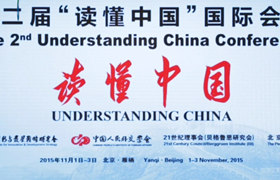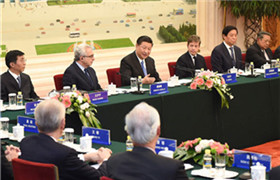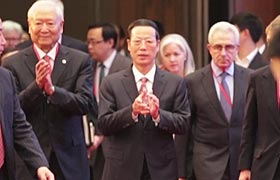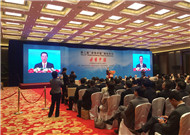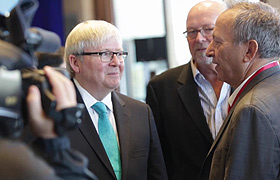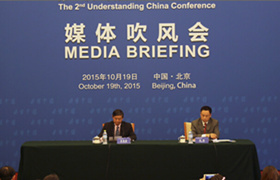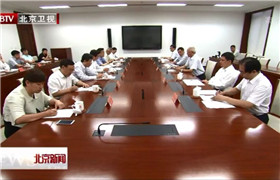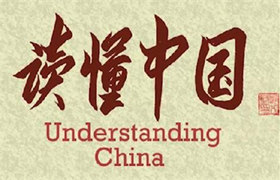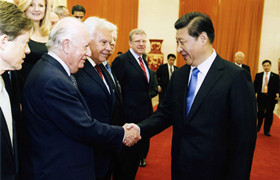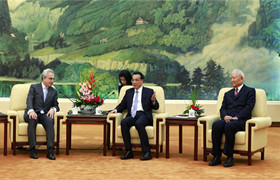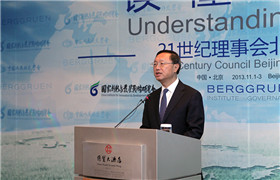- HOME--> Chairman
-
A Bright Future of International Relations
--Except of the Talk with Yohei Kono, Former Speaker of the House of Representatives of JapanSource:
Zheng BijianMy old friend, all of our meetings have been friendly and sincere. Your comments on the changes occurring in the international situation are illuminating to me. Now I would like to spend some time talking about the major trends in international relations in the year 2014.
The first major, or most pronounced, trend is the emergence of the what I call “three landscape” paradigm. These include the “East European landscape” under the ongoing crisis in Ukraine, the “Middle East landscape” under the turbulences in Iraq and Iran and the Palestine-Israel conflict, and the “Asia-Pacific landscape” disturbed by the return of the United States to the region. All major forces related to these “landscapes” are engaging in complex interactions and counteractions, having caused an array of profound changes.
Within the “three landscape” paradigm, changes in the triangular relationship among China, the United States, and Russia seem to be the most prominent. The triangle is markedly different from the big triangle composed of China, the United States, and the Soviet Union in the Cold War era. One distinguishing characteristic of the “new triangle” is that Russia is oriented toward the East to certain extent. It does so driven by the United States and not for any other conceivable reason. We in China have no reason to keep Russia from getting closer to the East. Since they have no choice but to do so, that is to seek cooperation for mutual benefits with us, under what pretext can we attempt to keep them out? So, today we have a “new triangle” among the three countries.
Now let’s consider China’s external environment. It is the above two trends that have given rise to the what I call “two lines”, one in the North and one in the South. By the former, we mean China is developing good relations with Russia and Central Asia and, in doing so, promoting Shanghai Cooperation Organization. Also, China and Europe are becoming closer to each other. Just think about the many cooperation agreements Premier Li Keqiang have just signed with Germany, Italy and Russia during his visit to Europe! So, there is vast space for Euro-Asia cooperation. Is this what we want? I believe so. This is good not only for China but also for the world at large. Why so? Our market is becoming bigger, and our cooperation in economic, cultural, and science and technology areas is expanding. Is there any inherent risk for war in all these? I don’t think so. These are positive, healthy, and encouraging developments.
Nevertheless, the Northern line is associated with many issues, including terrorism, separatism, and extremism. What can we do about these? We have no choice but to tackle them and do so in the long term. China’s Xinjiang is involved. Some terrorists from the region maintain connections with terrorist forces in many regions, including Central Asia. We are fully aware of the situation. We have been dealing with it calmly and confidently, and it is now within, rather than out of, our control on the whole.
Here I want to emphasize that China-Russia relations and Shanghai Cooperation Organization represent new-type cooperative relations that are open and non-exclusive. They are nothing like the Warsaw Pact, NATO, or the like. The Chinese people have seen through the latter, which invariably bring harm not only to others but also to themselves.
Now, let me discuss the Southern line in some detail. This line is troublesome not only because it involves Sino-Japanese relations, Sino-Pilipino relations, and Sino-Vietnamese relations but, more essentially, because it is linked to the return of the United States to the Asia-Pacific. The US has made the decision to “pivot” back because it sees its military alliance with Japan as the cornerstone of its security interests in the Asia-Pacific and also because it wants to ease the restrictions on Japan’s “collective self-defense right”. Some in Japan allege that the reason is that the Chinese have been provocative. I would refute by asking, “Did the Chinese cause the Diaoyu Island issue?” It came about all because of the “nationalization” program of the previous Japanese cabinet. Did the Chinese cause the South China Sea disputes? In fact, we have insisted that these be settled through consultation. However, the Vietnamese and Philippines have built oil rigs across the nine-dash line for oil drilling! We don’t have any of those in South China Sea! Our stand on the issue has consistently been that of putting aside disputes and seeking joint development.
However, not a trace of that has happened. There is nothing we can do about it! Look, the United States has come up with something, which is beefing up its military alliance with Japan to control and encircle China. We have put forward the initiative of building a Maritime Silk Road, but it is under the threat of the US-Japan military alliance.
Having said that, I don’t think the Southern line is completely hopeless. In my view, there are two sides to the issue. On the one hand, the US and Japan contain China through their military deployments, mainly their military alliance. On the other hand, there is the real need for cooperation in trade, finance, science and technology, education, and so on. Economic cooperation between China and the United States takes place on a massive scale, which is unprecedented in history. Such cooperative relations are well established and are broadening and deepening. Isn’t this duality we are witnessing? Also, China and Japan need to strengthen cooperation.
The duality will continue and is likely to be a major trend in the world. It is likely to be a major trend because the people want it. The vast majority of the people don’t want war but cooperation in the fields mentioned above. Given this, political figures of our two countries have special responsibilities. They need to adopt clear-headed policies to unswervingly carry out cooperation in those fields and resolutely resist expansion of the US-Japan military alliance with malignant intensions. Adoption of these policies will amount to what I call “new awakening” in the new era, which will make a fundamental difference. This “new awakening” and real efforts to put it into practice will lead to development, prosperity, and the people’s wellbeing. In contrast, the policy of pursuing US-Japan military alliance will only lead to a dead-end. Therefore, under the complex situation characterized by duality, the “new awakening” is precisely what brings hope to the Chinese and Japanese peoples.
In all, I have talked about “major changes”, “three landscapes”, “new triangle”, “two lines”, “new awakening”, and “two-sidedness”. Thus, we got a total of six major trends or concepts.
These concepts are closely related to the other concepts I had developed in the beginning of the 21st century, which include “China’s peaceful rise”, “peaceful rise of a large number of developing countries”, and “global convergence of interests and community of common interests”.
I am prudently optimistic and believe that a good future is ahead of us. The truly good things are to come in Asia-Pacific, including positive developments in Sino-Japanese relations.
This is an excerpt of the remarks Mr. Zheng Bijian made when meeting with Yohei Kono in Beijing on October 17, 2014. Kono is a Japanese politician and an old friend of the Chinese people. He was President of the Liberal Democratic Party from 1993 to 1995, Deputy Prime Minister from 1994 to 1995, Minister of Foreign Affairs under Prime Minister Murayama, Chief Cabinet Secretary, and Speaker of the House of Representatives from 2003 to 2009. On August 4, 1993, as Chief Cabinet Secretary Kono made an official statement on the comfort women issue, admitting, for the first time, that the Japanese Imperialist Army had used coercion in the recruitment and detention of women from Asian countries.
-
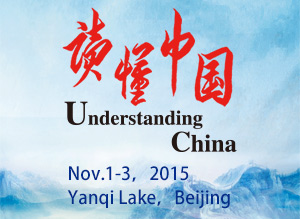
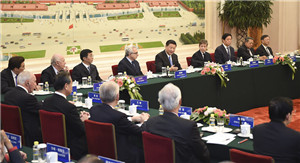
The 2nd "Understanding China" ConferenceOn November 1~3, 2015, the 2nd “Understanding China” Conference was held in Beijing Yanqi Lake International Conference Center. Zhang Gaoli, Vice Premier of the State Council, attended the opening ceremony.
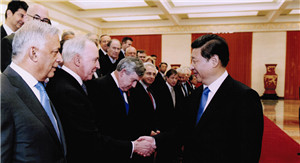
The 1st "Understanding China" ConferenceOn November 1~3, 2013, the 1st “Understanding China” Conference was held in Beijing, which was cosponsored by China Institute for Innovation & Development Strategy (CIIDS), Chinese People’s Institute of Foreign Affairs (CPIFA), and Berggruen Institute on Governance.
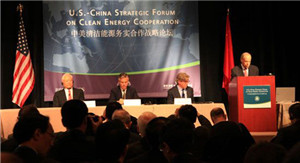
The 2nd U.S.-China Strategic Forum on Clean Energy CooperationWith the “Prospects for U.S.-China strategic cooperation in next decade” as its theme, the forum dwells on the implications of U.S.-China cooperation from the strategic perspective of coping with global challenges and maintaining world peace.
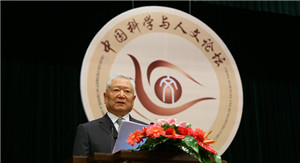
The China Sciences and Humanities ForumCo-initiated in April 2003 by renowned Chinese scientist Mr. Lu Yongxiang and influential political strategist Zhen Bijian, China Sciences and Humanities Forum was jointly hosted by Graduate University of Chinese Academy of Sciences (GUCAS) and the Higher Education Press.

